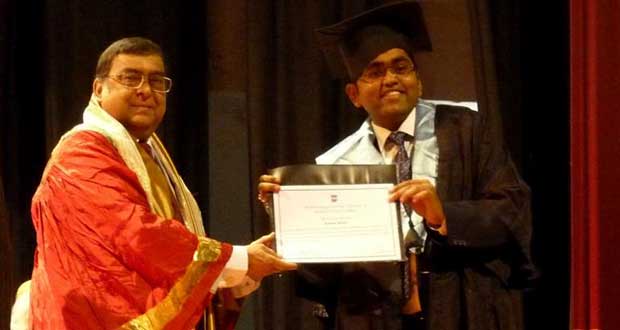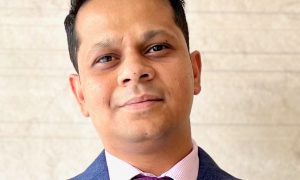Kumar Rahul graduated from NUJS, Kolkata, in 2012. After working for some time he quit to join his true calling, the judiciary. He cracked the MP Judiciary exam, being ranked 4th in MP. His preparation comprised taking mock tests, studying the basics of his law school curriculum, and going through the previous papers of MP Judiciary.
In this interview he talks about:
- Preparing for the Judicial Services
- Books and other knowledge sources helpful in preparation
- Staple questions which are asked
What motivated you to appear for judicial services?
Coming from a small place called Dumka in Jharkhand, I was lucky to have completed my graduation from NUJS. When I was studying law at NUJS, I always thought about pursuing something which would have a direct bearing on the society and people. However, after graduating I joined a corporate firm which I left to join a Public Sector Company but the same did not work out owing to certain exigencies. So, at this stage I had the option of going back to a law firm job or doing something which I had always dreamt of doing. Then, I zeroed in on the two most prestigious services in the country namely-Civil services and Judicial Services. But the higher degree of uncertainty with respect to civil services and my earnest desire to remain associated with the field of law had cleared the dilemma and I started my preparation for judiciary.
How did you prepare for the judicial services examination?
I took coaching classes. Coaching helps immensely in saving time as going by the vast syllabus, one may need more than a year to prepare notes while the same is done exhaustively at coaching within ten to eleven months. The second biggest advantage of coaching is that it enables one to focus on core areas and thereby facilitates strategic preparation and the mock tests for prelims as well for mains provide a platform for regular assessment. Apart from this, the environment also keeps one motivated as there are regular interactions between like- minded individuals pursuing a common goal. However, I must say that coaching is not indispensable for preparation but a good and committed coaching institute polishes your concepts and nurtures the judicial bent of mind required for clearing the exams. But one may always prepare on their own with hard work and proper planning.
I took coaching from one Rahul’s IAS from Mukherjee Nagar, New Delhi. I would definitely recommend this place if anyone wants to join coaching for judiciary.
Did you take mock tests during your preparation?
Yes, I did. Mock tests help an aspirant to test if he is able to execute his strategy which includes important aspects like time management, prioritising questions, finding out weak areas and keeping a check on the scores. Sometimes, questions which one has attempted in Mock tests are repeated in judicial examinations as one practices an inventory of questions. Since each mark is important so even if there are three to four questions which are exactly the same as that of the mock test then it provides an edge over the other candidates.
When did you start preparing for the exams?
Since I had not decided to write Judicial exams during my college years, I started preparing for the same when I left my job. I think this exam requires one year of preparation and therefore, if anyone wants to sit for judicial service exams, he/she should start preparing for the same during fourth or fifth year of law school.
How many hours did you put in for your preparations every day?
I never followed a set routine for everyday during my preparation. I did not study much in the beginning but within five months of my preparation, the notification came for the exam and the number of hours subsequently increased but I would like to mention that one should have fixed targets for the day or a week and not go by the number of hours.
How much time did you give to each subject?
I haven’t allocated any fixed time but subjects like CPC, CrPC, IPC, Evidence require more time as compared to less voluminous subjects like SRA, Limitation, etc.
What approach did you take to remember the sections of the acts in syllabus?
I have heard from many people that the judiciary exam is all about how much you can remember sections and language of Bare Acts. However, this is a common misconception among the aspirants. The exam primarily tests your concepts and knowledge of law. With the sound understanding of the concepts it is easy to retain important sections more effectively. There may be very few direct questions on a Bare Act in prelims exam. Therefore, only mechanical reading of Bare Acts will not suffice.
How much of a case law do you need to remember?
For prelims, one has to remember landmark cases in subjects like Constitution, CPC, CrPC, IPC etc. However, case laws help in writing answers for mains as they develop one’s ability to think like a judge and enhances the application of judicial mind. The quality of answers also automatically improves when we substantiate our answers in mains with the help of case laws.
One should be updated about the cases which are in news for interview.
What strategy did you adopt for preparing the subjects you had studied in college?
Since, the ambit of law is very broad, it becomes important to know what not to read for any competitive examinations. It is humanly impossible to learn everything in all law papers. Therefore, it becomes very important to plan a strategy for preparation. I made a strategy based on the previous year paper and focussed more on important topics.
Truly speaking, I have not studied subjects like CPC, CrPC, Evidence, IPC properly etc during my college and since, these subjects are very important for judicial service exams, I focussed more on these subjects.
It does help in your preparation if you have studied in college. I shall advise the judicial service aspirants to make a habit of reading Bare Acts and Case laws. This exam does not require research on any topic but instead, you have to be very smart with your preparation. You may study less but you should revise regularly whatever you study.
Which books/materials did you rely on while preparing?
Since, I got immense help from the notes which I prepared during my classes at coaching institute; I referred to books only for clarifications on few topics.
However, here is the list of books which one may refer:-
| Subject | Book(s) Recommended |
| Constitution of India | Bare Act, Pratayiogita Darpan (Polity issue), M.P.Jain |
| Code of Civil Procedure | Bare Act, Takwani |
| Transfer of Property Act | Bare Act, Poonam Pradhan (lexis Nexis) |
| Indian Contract Act | Bare Act, Avtar Singh |
| Specific Reliefs Act | Bare Act, Avtar Singh |
| Limitation Act | Bare Act, J.D.Jain |
| Indian Evidence Act | Bare Act, V.P. Sarathi, Batuklal |
| Indian Penal Code | Bare Act, K.D. Gaur |
| Code of Criminal Procedure | Bare Act, Kelkar |
| Negotiable Instruments Act | Bare Act |
| MP Accommodation Control Act | Bare Act |
| MP Land Revenue Code | Bare Act |
Which books/material did you use for preparing for the general knowledge section?
For the static part, I referred to Upkar, Lucent’s GK and Arihant’s GS for MP and for current GK, I referred to a Hindu newspaper and monthly issue of Pratyiogita Darpan.
How would you recommend one should prepare for the English knowledge and computer knowledge sections?
One may refer to Objective General English by R.S. Aggarwal and Lucent’s Computer for questions relating to computers.
Did you regularly read newspapers?
Yes, I regularly read the Hindu and it helped in attempting General knowledge questions and writing the essay in mains paper. One should at least spend an hour everyday to read any good news paper and if possible, he/she should note down important points. The editorial part regarding legal developments is a very good source for essay.
How would you rate the preliminary examination question paper on difficulty?
I honestly do not consider prelims to be difficult provided one prepares with hard work and diligence. Since prelims is gateway for mains and interview, it becomes really important to focus properly on the bare act and one cannot afford to be selective in his preparation for prelims as even a single question can make a huge difference. One should practice questions from a standard book on each subject.
How did you prepare for the segment on certain state acts passed by the M.P. legislature, since they are not taught in law schools?
There were two local Acts which are asked in MP Judiciary: – Rent Control Act and Land Revenue Code. I have analysed previous year papers and found that the questions were almost from Bare Acts. Therefore, I have referred to Bare Acts and a few High Court and Supreme Court cases on important topics.
During the main exams which consist of four papers, you are given two question papers simultaneously. How did you divide your time between the two?
I gave equal time to all the papers as the marks allotted to each were identical.
How did you manage your time among the questions in each paper?
Since, in the first paper, all questions were from law carrying equal marks, I gave equal time to every answer. In the second paper, I divided my time according to the marks allotted to the questions asked in the paper.
Would you say some of the sections are easier to score compared to others?
The questions on essay writing, precis and translation do not require as much effort and with weekly preparation also one can excel in those areas whereas the questions of law are more demanding as they require regular revision and brushing of the concepts.
What structure did you follow for answering a question in the main exam?
There were mostly theoretical questions from law in Paper I and therefore it becomes very important how you write your answer in mains within a very limited time. I have tried to include object, policy and landmark cases as I believe that these are the requisites of a good answer.
Did you practice writing the answers?
I practised writing answers to almost all questions of last ten years which helped me immensely while writing answers during exam with respect to content and time management.
Had you prepared some topics in advance for the write up section?
I had chosen a few topics based on the questions asked in previous year.
How did you prepare for the summarization exercise for the exam?
The question on summarization exercise was pretty simple. I have not referred to any book for the same. I practised a few questions asked in previous years.
Did you practice reading lengthy court documents to increase your reading speed and comprehension?
No, I did not refer to any such documents. However, I read few judgments of MP High Court for judgment writing in mains.
What is the level of Hindi proficiency required for the translation exercise?
Since Hindi is mostly used in the lower courts in MP, one should have fair understanding and at the same time the ability to write in Hindi. If one wants to refer to any textbook then Sighal’s guide is a decent book available in the market.
Did you practice translation exercises during your preparation?
Yes, I practised a few questions which were asked in previous years.
How did you prepare for the judgment writing exercise?
Judgment writing is very important to clear mains. Out of 200 marks in mains, 50 marks have been allotted for judgment writing. This is the part which many students ignore and since there is a minimum cut-off for each paper, it becomes very important to get a good score in judgment writing.
There are two judgment writing questions asked in the mains- one on civil law and another on criminal law. It is advisable to follow the format of trial court of MP for judgment writing. The main part is how you appraise evidences in a given factual situation. You may decide the case in anyone’s favour but your reasoning should be sound and cogent.
For judgment writing, I practised previous year papers and read a few High Court judgments.
How would you rate the main exam question paper on difficulty?
The exam is not difficult as such provided one has prepared well with a good strategy.
Did you appear for mock interviews?
Yes, I attended a few mock interview sessions organized by my coaching institute. These mock interviews helped me a lot in building confidence.
Any specific strategy you used during the interview?
I haven’t adopted any specific strategy for my interview preparation. I simply revised all my notes before the interview and prepared questions based on my background, home town, college, work experience, recent legal developments etc.
Do you remember any of the questions asked during the interview?
Questions were mostly from simple concepts of procedural law (CPC, CrPC) and local Acts and my background. Some of the questions which I can recall:-
Why do you want to work in MP?
Where have you worked previously?
Why the Judiciary?
How are issues framed in Civil cases?
Provisions and safeguards regarding arrest under CrPC
What is an interpleader suit under CPC?
Question on power of court under S.313 CrPC.
Questions on 2013 CrPC Amendment Act.
Who is a pauper according to CPC?
Difference between inherent powers under CPC and CrPC.
Whether accused can be acquitted after prosecution evidence in Court of Session trial?
Questions relating to Nistar Patrika and Wajib-ul-arz as given under the MP Land Revenue Code.
Can there be an investigation in a complaint case?
Lastly, what message would you like to give to graduates aspiring for judicial services?
Graduates aspiring for judicial services should not be in awe of this exam but move ahead with confidence and a positive attitude. This exam requires constant absorbed hard work with proper planning throughout the preparations. One should be able to identify the core areas of the subject and focus more upon them. Candidates should have their own strategy whatever suits them and stick to it. They need to stay focused and shall remain detached from any distractions especially the ones coaxing them to think about other career options. Aspirants should never get paranoid about the time they spend while preparing as at the end of the day all their efforts will reap sweet fruits of success. No hard work goes in vain.
























